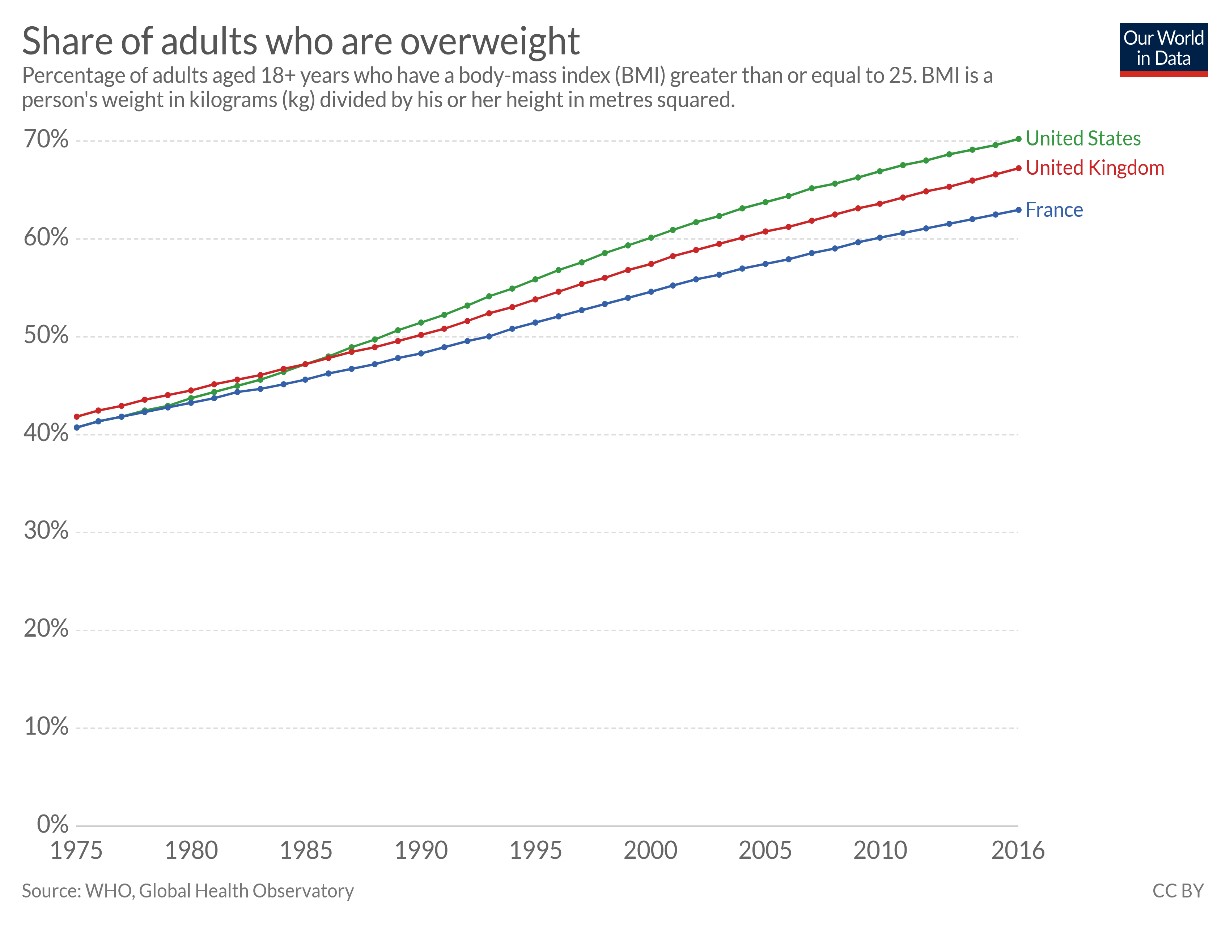Weight burdens countries all around the world
Leading a healthier lifestyle in order to feel better in one’s skin, to have more energy and motivation, and to accomplish the things that are important to us, takes more than how we fuel our body. Nonetheless, what we eat is a central pillar of our health.
And when we think about making healthy changes, we often start with what we can easily notice on the outside and with how we feel in our skin. Sometimes it also manifests in the form of preventable chronic diseases related to overweight and obesity: allergies, gut problems, cholesterol, diabetes, strokes, heart disease, certain cancers and more.
Undeniably, in trying to be healthier, the first thing that comes into focus in our mind is our weight. And indeed it seems weight weighs on people’s mind worldwide.
The WHO’s Global Health Observatory has it that in 2016, 39% of adults 18+ worldwide were overweight and 13% were obese.
That represents 1.9 billion overweight adults and of these, more than 650 million were obese. The USA leads the pack of industrial countries. According to the CDC, “the prevalence of obesity was 39.8% and affected about 93.3 million US adults in 2015-2016.”
The mindset that has set us all up for failure in handling weight
Most of us know that the way we eat, our lifestyle habits and our emotions are the major culprits for weight gain.
But what seems to be leading the trend of this steady increase in overweight and obesity is a determination to solve this problem through a quick fix: diets based on calorie restrictions or major food group limitations.
While there are more overweight and obese people than ever, the weight loss industry has also ballooned to $72 billion dollars in 2019 (2). And it is still touting the very message that has kept people’s weight increasing around the world steadily since the 1960s.
This belief that losing weight is a simple calorie equation where energy input must be inferior to energy expanded is clearly not working!
The overweight rate refers to having a BMI greater or equal to 25, while obesity is defined has having a BMI greater or equal to 30. Our World In Data (1) shows us in the graphs below that:
- In 1975, the overweight rates both in France and in the US were 40.8%. They have steadily increased to reach in 2016 62.9% in France and 70.2% in the US, where the increase has been larger.
- In 1975, obesity rates were 9% in France and 12% in the USA. They steadily increased and in 2016 reached 21.6% in France and 36.2% in the US where the growth was sharper again.


These graphs alone are enough to enlighten anyone. But our environment, habits and behaviors have also been changing dramatically.
In a world where convenience reigns, many people still want to keep believing there is a shortcut, that dieting and depriving their body and brain of important nutrients in a short period of time is the way to go.
Diets and food fads keep coming. And the shorter the diet duration, the most calorie loss peddled, and the more popular it is.
In January 2018, Linda Searing wrote in the Washington Post that about 45 Million Americans go on a diet each year, mostly after the excesses of the Winter Holidays. And it is also estimated that only 5% will manage to keep the weight off in the long term. (3)
The numbers that tell us dieting fails
Indeed, it is not just that the public should face the fact that diets don’t work in the long run. It is also vital to understand that dieting will set most people’s body on a course of deception and more weight gain in the future.
Most dieters will gain back the weight, some more even, after a certain period of time. The statistics are (4)(5):
- Within two weeks, 25% of Americans will give up on their weight loss goals.
- More than 95% of people who follow a diet relapse in 5 years or less.
- 65% of people who successfully complete a fad diet will end up gaining back all the weight they lost lost within three years, according to Gary Foster, Ph.D., clinical director of the Weight and Eating Disorders Program at the University of Pennsylvania.
- “The statistics for dieters who lose weight rapidly, according to Wellsphere, a website sponsored by Stanford University, is worse. Only 5 percent of people who lose weight on a crash diet will keep the weight off. Crash diets include any unhealthy diet, from severe calorie-restriction diets to diets that consist of only a few kinds of foods.” (5)
- 41% of dieters gain back more weight than they lost after 5 years (6).
We must face the truth: dieting and calorie restrictions or major food group limitations is making people fatter, it is NOT the solution to the weight problem.
But why is it exactly that, what seems like an obvious and fast solution, is counterproductive for weight loss and its long-term maintenance?
Why are willpower and calorie or food restrictions doomed to failure?
Yes, diets will work in the short term. Essentially… while you are on them… And the weight loss will be proportionate to the extent of the restrictions. The solution for losing and stabilizing weight is to understand how our brain works!
Indeed, our brain really controls our hunger and our energy use, mostly without us even being aware. And the brain has its own idea of what our weight should be.
This explains why reducing portions and calories to lose weight is ineffective in the long run. We forget that our genetic evolution has predisposed our body to respond when famine strikes in order to rebuild lost reserves:
- The body doesn’t see a difference between deliberate restriction and involuntary famine! So the metabolism adapts and slows down to maintain its reserves and fight off weight loss. But after your diet is over and once you eat again a wider variety or larger portions of foods, your metabolism now burns less effectively than before the diet.
And the strongest way the body fights back when blood sugar drops is by secreting hormones that encourage weight gain, especially by increasing fat storage around the belly:
- Ghrelin, the “Hunger hormone” that controls your appetite is secreted to signal hunger to your brain when your body has too little reserves. Studies show that ghrelin levels keep elevated no matter the duration of the diet. One study in the American Journal of Physiology Endocrine & Metabolism found that the level of ghrelin stays elevated even two years after the end of a lifestyle induced weight-loss study on obesity patients (6). And the warning is that no matter how much willpower you yield, eventually you will surrender to that feeling of being constantly hungry and increase your food consumption, in order to stop that starving feeling and to get that boost of reward when you eat!
- The Emotional impact of this restriction and the hunger that goes with it stress you and make you more irritable. Your body experiences a flight/fight situation and releases cortisol “the weight gain & mood hormone” and adrenaline, our main “stress hormone”. Now you are not just hungry, you are “hangry” since hunger makes us feel a similar stress response as the triggers that lead to impulsive and angry behaviors. Men are actually more susceptible because these hormones are combined with higher levels of testosterone, so hunger suits even less the male population.
Sandra Aamodt, the neuroscientist and author of “Diets make you fat” sums it up perfectly:
“if diets worked there wouldn’t be a diet born every week and we would all be thin!”
Simply put, she explains that our brain has a set point for our weight, or rather a target weight range within 10-15 lbs. Our weight can fluctuate up and down within that range depending on our nutrition and lifestyle choices.
But keeping our weight down outside that target range is extremely difficult. And with age, this range increases as our metabolism naturally slows down, and especially if a person is sedentary and inactive.
This explains why the majority of people who lose weight eventually gain it back, or regain even more. By stressing our body with unnecessary famine, our body lowers its metabolic rate and produces hormones that promote weight gain, thereby creating a vicious cycle.
And this is how yoyo-dieting can happen. The land where you live your life constantly feeling guilty and dissatisfied with yourself and obsessed with losing weight. And while you are being that person, you are neither healthy nor living your life and doing the things that make you happy!
What to do to effectively lose and stabilize your weight
It is clear that there is no effective and durable quick-fix to being overweight and maintaining weight.
Most researchers and doctors still agree that the best way to go for long-term effective weight loss and maintenance is to set progressive objectives tackling both nutrition and exercise.
I would add to that: learning to regulate stress, handle difficult emotions and build up resilience, create conditions for quality sleep, foster healthy supportive personal and work relationships.
In the end it is about gradually adopting lasting healthy behaviors regarding nutrition and lifestyle.
A planned step-by-step approach that includes education, testing, curiosity and a supportive environment are our best allies to explore our own needs and avoid the overeating that leads to weight gain, lack of energy and moodiness.
Here are some of the ways my clients succeed in lowering and maintaining their weight following my programs:
- Carefully planned personal objectives
- Bio-individuality, what works for their taste, body, mind and existence
- Progressive Implementation of change of habits
- Accountability
- Optimal nutrition exploration
- Mindful eating
- Awareness, breathing, meditation and mindfulness practices
- Supportive environment & lifestyle adaptation
- Mind/Body wellness education
There is no quick fix, we must take the reins of our own well-being and educate ourselves where is needed to lead the healthy fulfilled life we want. And there is nothing wrong with learning no matter where you are at.
What would be a terrible shame is for you to start yet another diet and with it, another round of disappointment down the road. I urge you to take charge and to empower your beautiful self to make healthier choices and to ditch the diets once and for all!
Happy Healthy Long Life!
Cassis
Do you want to find out if my personal coaching programs are right for you?
- https://ourworldindata.org/obesity retrieved from site on 7/11/19
- https://www.businesswire.com/news/home/20190225005455/en/72-Billion-Weight-Loss-Diet-Control-Market retrieved from the site on 7/11/19
- https://www.washingtonpost.com/national/health-science/the-big-number-45-million-americans-go-on-a-diet-each-year/2017/12/29/04089aec-ebdd-11e7-b698-91d4e35920a3_story.html?utm_term=.286847a840ccretrieved from the site on 7/14/19
- https://healthresearchfunding.org/23-exceptional-fad-diet-statistics/ retrieved from site on 7/12/19
- https://www.livestrong.com/article/438395-the-percentage-of-people-who-regain-weight-after-rapid-weight-loss-risks/ retrieved from site on 7/14/19
- https://www.nytimes.com/2016/05/08/opinion/sunday/why-you-cant-lose-weight-on-a-diet.html retrieved from site on 7/14/19
- https://www.physiology.org/doi/full/10.1152/ajpendo.00322.2017





One thought on “Why diets don’t work?”